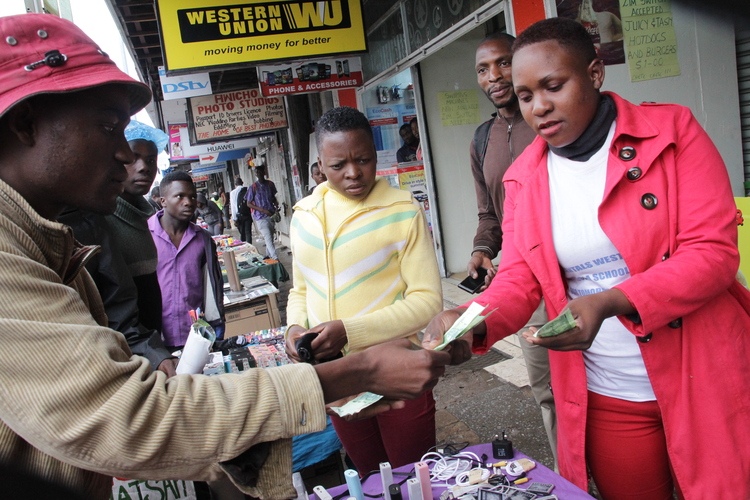Zim warms up to bond notes

Christopher Charamba Review Correspondent —
The introduction of bond notes this week has begun the process of alleviating the cash crisis in Zimbabwe. Forget the rumour mongers and the naysayers, the general public has been receptive to the bond notes which are being accepted by retailers and vendors alike.
Disregarding the uptake from the market, some malcontent have tried to sabotage the bond note and cause panic by spreading rumours that it has already been devalued and trading at 100 bond notes for US$70.
Raymond Chimedza, a money changer at Roadport bus terminus in Harare, dismissed the rumours. He said doubters can visit the Roadport and see what is actually happening.
“I have heard the rumours that we are trading bond notes at a different rate to the US dollar but that is not true. The bond note and the US dollar are rated at 1:1 as we were told. People are coming and buying the Rand from us using both US dollars and bond notes and we are giving them the same rate for both.
“Whoever is saying those things must come and do it here. Those are lies. The rate for the USD to the Rand is at 1:13.40 so if you bring $10 in US or in bond notes, you will get R134 but because we do not have loose amounts we will give you R130,” he said.
Chimedza said they had no problems with trading the bond notes thus far and people had been accepting them when they trade in Rand as well.
“People have been coming with their bond notes and we have been giving them the Rand. If you’re coming from South Africa and want USD we will give you bonds or USD depending on what we have at the time,” he said.
According to Chimedza, they do not actually change bond notes to US dollars so he is unsure of where the rumours could have come from.
“We don’t change US dollars to bond notes because there is no difference between the two. Why should I exchange them? The only time I would do that is if someone wants change.
“If someone wants to change their small notes to big notes, then we will charge you $2 per $100. So if you have 100 in one bond notes and you want a single $100 note then it will cost you $2. We have not traded bond notes at a different rate and I don’t know where people are getting that idea from,” he said
Aside from the rumours that bond notes were already devalued, there were fears that retailers would not accept the surrogate currency.
A video circulated on Monday showed a manager of a major retail outlet rejecting the money. The outlet had, however, not received the security features of the bond notes and was not accepting them until it had.
As of Tuesday, most retailers and places of business were accepting bond notes. Puma fuel service station even created a poster showing the various payment options it was taking, including bond notes.
Tendai Kusangaya said she was pleased that bond notes were being accepted by retailers with no hassle as it gave her confidence to use them.
“I am glad that the bond notes have come and that people are accepting them. They were many rumours on social media and videos of places rejecting bond notes but from the places that I have been to I have had no problems with them.
“The bond notes are only $2 which I think was a good thing because they haven’t driven out the US dollar from the market. We still get the other denominations of the US dollar.
“In fact, now I can get more money from my bank because my bank is giving out an additional 50 bond notes on top of the US$100 that I was getting per day,” she said
However, Kusangaya was concerned that there were still long queues at the banks and wondered when these would decrease.
“The biggest problem that I have faced right now is that there are still queues at the bank. I think people are excited that they can now get more money and are rushing to do so. I just hope that the amount of money released into the economy increases so that we don’t have to queue so much.
“Bond notes we were told will ease the cash crisis and we are waiting for this to happen. That said, I am glad that they have been accepted by retailers and vendors and I don’t have a problem buying the things that I need.”
Mai Tafadzwa, a vendor who sells fruits and vegetables near Copacabana in Harare, said she was sceptical of the introduction of bond notes but they seem to be working.
“We are taking bond notes because we have been told that they are 1:1 with the USD and this seems to be the case. I personally have had no reason not to take them now that I have seen them in use. On the first day, of course we were unsure whether they were real but after seeing that they were being accepted in the supermarkets, we became more confident that they were the real notes and could be used.
“Another reason why I was sceptical about taking them was because I did not know if my supplier would want them. When I went to restock on Tuesday I asked if they took bond notes and they said yes, so on my side it’s not a problem, I will accept them,” she said.
Mai Tafadzwa’s wish is for the Reserve Bank to provide adequate education to vendors on the security features of any new money they intend to put into the economy.
“I think before RBZ releases other notes into the system they need to inform not just the banks and the major shops about the security features but also educate us the vendors. Every day we deal with a lot of people buying from us and we are sometimes scared to just accept new notes that have never been seen before because they could be fake. I think that if there is proper education, it could help us a lot not to be cheated,” she said
Regarding rumours on bond notes, Zimbabwe National Chamber of Commerce CEO Mr Chris Mugaga said the public should be wary of messages circulating on social media and look for reliable sources of information
“People should not thrive on rumours. When I made a tour of the city I never saw people trading the US dollar. Why then should people want to believe what they read on WhatsApp when they can go and find out the truth?
“Zimbabweans are not naïve; I do not think they are. Why would anyone sell their bond notes at a lower rate to the USD and make a loss when they can just deposit them into the bank?
“That would be making life worse for yourself, would it not? Jumping out of the proverbial frying pan into the fire as it were,” he said
Mr Mugaga said that from the look of it, the market had accepted the bond notes as people were using them. He however, added that there was need to increase the circulation of the bond notes.
“My greatest fear right now is that the bank will apply a divide and rule system where they give the bond notes to the ordinary man and reserve US dollars for top notch individuals. That would not be good.
“That would end up devaluing the bond notes because there would be more people with bonds than with US dollars. The balance has to be maintained with equal access to bond notes and US dollars for all.
“The RBZ has to be on the ground to monitor this situation and make sure that major players, who are the banks, do not withhold US dollars otherwise this will create the devaluation issue that people fear,” he said.
Economist, Mr Daniel Ndlela said regarding use of bond notes, the authorities must be diligent to and make sure that people have adequate information to ensure that bond notes do not end up trading on the parallel market.
“We have to look into the question of why do people want US dollars? People think that when you are going to South Africa or Botswana or Zambia you need US dollars so that you can trade them there and buy what you want. But you no longer need hard currency for this. You can simply put money into your bank account and then go and use your VISA or Mastercard in South Africa or any other country.
“There is no need for people to be travelling with swathes of cash. In fact, it’s cheaper for people to use their cards when they travel than have to exchange the cash that they have because you are charged a fee to change money,” he said
Mr Ndlela felt that the marketing campaign had not adequately informed people that they should rather use bank cards rather than cash especially when they travel
“I don’t think information on alternatives to cash has been made clear to people. I saw a few adverts to that effect but generally I think that there needs to be more awareness for people to use their bank cards especially if they want to travel.
“You don’t need to carry cash to Mussina to buy your groceries. You can get there and swipe.”
According to Mr Ndlela, it was likely that people who wanted to buy US dollars were doing so to store it and keep it off the market. He added that for this to be avoided there would first need to be confidence in the bond notes.
“Why would anyone want to buy US dollars when we have been told that the bond notes are equal to US dollars and that your bank account remains a US dollar account? You can easily use your bank card.
“The only reason I see people wanting to buy US dollars is to hoard them. The issue of bond notes is one of confidence. Economic principles tell us that bad money will drive out good money. That means that when people withdraw 50 in bond notes and $50 in US dollars they would rather hold on to the US dollars and use the bond notes. They will even stop banking the US dollars.
“So until there is confidence from the market in bond notes then there will be this issue of bad money driving out good.”
In a statement by the Bankers Association of Zimbabwe, banks said they had witnessed an encouraging uptake of the bond notes since their introduction on Monday.
An initial $10 million worth of bond notes was released into the market. It is anticipated by end of December 2016, bond notes equivalent to $75 million will be circulating in the market.
The bond notes will be released into the economy in sympathy with export receipts through normal banking channels up to a maximum ceiling of the facility of $200 million.
Feedback: [email protected]











Comments